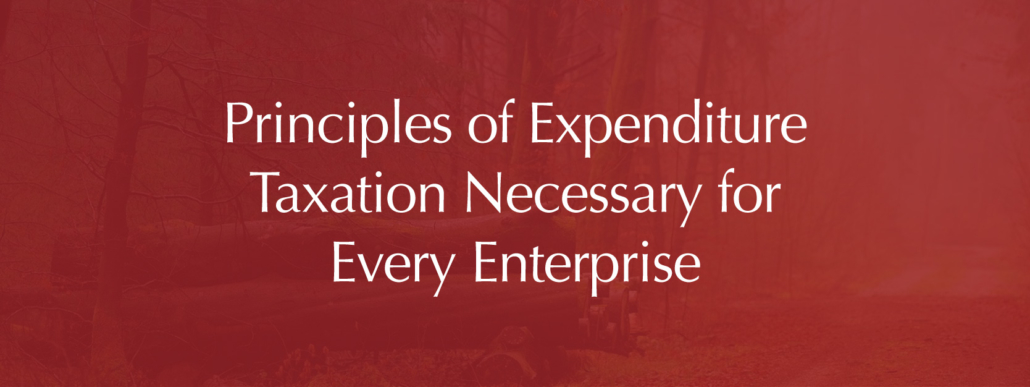Principles of Expenditure Taxation Necessary for Every Enterprise

Regardless of the area in which your company operates, you generally need to know what the state is charging you for. You might also want to know what the benefits are provided by the state so that you do not pay more for ignorance than you really should. We are talking about the taxation of expenses, i.e. the logic of corporate income tax in Estonia and elsewhere, tax-exempt and non-taxable expenses, fringe benefits and non-business expenses.
Corporate income tax
Income tax is a widely used tax levied by the state on companies that make taxable or ineligible costs.
The income tax rate in Estonia is 20%, which applies to the gross amount, which means that if you calculate from the top down, you will have to withhold 20% of the total amount. If you make the same calculation from the bottom up, you have to add up to 25%.
Example:
gross amount 125 – 20% income tax = 25
net 100 * 25% income tax = 25
There is, in fact, nothing unique about implementing income tax. The same principle is used also in other countries. However, while in most countries it is common for corporation tax to be paid on the company annual profits, in Estonia we pay taxes monthly and also when we withdraw from the corporation or make taxable expenses. However, unless you withdraw your income and use it for investment, you do not have to pay income tax.
Income tax practice in Estonia and other countries:
- in other countries – annual income tax on corporate profits including incorporation of “Ineligible Expenses” in Tax Returns
- in Estonia – income tax on dividends, investments are tax free
- payment of income tax (and sometimes social tax) on “ineligible expenses” on a monthly basis
Tax-free costs
Tax-exempt costs include the costs for which the link to the business is clearly justified, necessary to maintain or develop the business and the costs arising from the Occupational Health and Safety Act.
In addition, there are a number of special rules in Estonia that do not have to be declared or taxed, but subject to certain limits and rules. These include, for example:
- mission expenses (travel, accommodation)
- home office expenses (reimbursement of utilities %, repairs, furnishings)
- occupational health costs (medical examination, ergonomics, procedures prescribed by the occupational health doctor).
We also have expenses that are subject to special rules and must be declared. Examples are:
- car compensation (business travel, 30 cents / km, 335 euros / month)
- sports allowance (€ 100 / quarter, specific list of eligible costs).
Taxable costs
In addition to wages and dividends, there are 3 types of expenses in Estonia – these are fringe benefits, which are taxable and income tax, gifts-donations-reception expenses, which are taxed only with income tax, and the third type is non-business related expenses and disbursements. Taxable expenses cannot be refunded.
1. Fringe benefits
Fringe benefits can in principle be regarded as an employee’s pay supplement. These are the things a person would otherwise buy from their net salary. The logic behind this is that if the thing you buy has financial value for the employee and is not directly necessary for the business, it will be taxed in much the same way as wages. However, if it is not financially measurable (e.g. flowers) or is necessary for work (e.g. office chair, pen, car), it does not qualify for fringe benefits. However, when it comes to work, the price is not important. You can buy any high end chair or car for your employee, as you see fit.
The fringe benefit can be granted to an employee under the Estonian employment contract, an employee with a VÕS (Law of Obligations Act) contract and a member of the management board + their family members. If the company belongs to a group, so do the employees of other companies. If you have an employee in Latvia, his / her salary and fringe benefits are subject to tax there, he/she is not included.
Examples of fringe benefits:
- private car and housing costs – both subject to special rules and limits
- catering – with the exception of a hotel breakfast (not separately invoiced) and a training or event in an out-of-town tourist farm where there is no other catering option
- selling or providing your goods/services at a lower price
- buying more expensive goods/services
- non-employment insurance premiums, while travel insurance is not
- interest-free loan, non-recovery of a loan
- training that is not necessary for work – does not include general management training, marketing training, financial training, if the company is investing, also investment training, etc.
Taxation of fringe benefits in Estonia is similar to wages, except that it does not include unemployment insurance or pension contributions. Another important difference from wages is that fringe benefits are not personalized. It does not affect the average person’s salary or tax-free accounting and does not concern bailiffs. This is a pure business expense that is not declared per person.
special discount price: 100
income tax: 100 * 20/80 = 25
gross value of fringe benefits = 100 + 25 = 125 (amount before deduction of income tax)
social tax: 125 * 33% = 41.25
to pay the state total: 25 + 41.25 = 66.25
2. Gifts, donations, and reception expenses
Gifts, donations and reception expenses are subject to income tax of 20/80. They are also subject to different tax-free thresholds and exemptions.
1) A gift is a free good or service that does not require consideration from the recipient.
A sample does not include a sample of your own merchandise, promotional gifts of up to 10 euros, writing off a bad debt claim or stolen merchandise, a discount or sponsorship provided if it is counter-productive (in essence, buying and selling advertising services).
2) Donation is always for charitable purposes.
If a donation is made to a non-profit NGO listed (must always be checked, as the list is updated every month), it is tax-free within certain limits – limited to 3% of gross salary or 10% of last year’s profits. If the NGO you are donating to is not on this list, the donation is taxable in the same way as a gift.
3) Reception costs mean entertainment for business partners, which may include business lunches, cinemas, theatres, parties, receptions, etc. These are events where business partners associated with the company are present.
- tax-free threshold: 32 euros per month, no matter the size of the business, + 2% of your declared gross salary, cumulative over the calendar year – if you haven’t used it during the year, you can spend the entire sum in December and have a big Christmas party.
The important thing is that you need to note who attended the event. If you have a business lunch check, you write down the name. If you have a party, you add a program and a list of participants.
PS. If a company organizes a work-based training day, it does not fall under the cost of admission and is not taxable.
3. Non-business expenses
In the eyes of the state, the company should not have to pay any non-business expenses at all and it is a less frequent type of expense than the previous two. This includes statutory penalties, essentially non-business expenses and transactions with low-tax countries.
1) The penalties provided for by law:
- tax interest, tax fines
- fine for failure to submit an annual report
- property confiscated in criminal proceedings
- increased environmental charges.
It does not include:
- contractual penalties
- parking fees or late fees – if the employee violates the parking regulations, it is the employee`s responsibility, so you have to consider, if it is a business expense at all.
General Principle: If a fine is imposed by law and imposed by a public authority, it is subject to income tax. If the fine is from a private company under a contractual relationship, it is not a subject to taxation.
2) The following non-related costs:
- unnecessary non-business membership fees – non-business non-profit membership fees. However, when it comes to professional organizations for employees, such as the Accountants Council, this is appropriate.
- the costs of the owner’s other business – very often mistaken. It is clear that if one company has very clearly ineligible costs, they are subject to income tax. In addition, a board member’s own expenses are subject to fringe benefits.
- acquisition of non-business assets, bearing expenses
- undocumented expenses – expenses that do not have a cheque. The alternative is that the person who made the expense returns the money to the company, e.g. a board member.
- bribery and payoff
It does not include:
- unnecessary costs paid to employees (these are fringe benefits and subject to double taxation).
3) (Suspicious) transactions with low-tax countries:
There is no exact register, but the tax office has a list of countries NOT considered to be low tax rate. Even with non-member countries, regular transactions are generally ok. Taxation is in order when you suspect money laundering or things that seem suspicious.
This includes:
- acquisition of securities
- acquisition of a holding
- large penalties for late payment and penalties
- granting a loan, making an advance payment
- purchase of unverified goods or services.
List of countries not considered to be low-tax rate:
Generally speaking, such things are no longer worth doing these days, as both the bank and the accountant are obliged to hand them over to the Estonian Financial Intelligence Unit (FIU) who deals with money laundering. Be aware that banks have become much tougher with their rules.
To conclude
If you are an entrepreneur or a business executive, you need to have an overview of what you need to pay taxes to the state. For example, if you make fringe benefits to employees, you will have to pay both income tax and social tax, and you will not be able to recover VAT. But if you make gifts and receptions, there are also some pretty good tax breaks.
In general, Estonian companies tend to underutilize tax incentives, meaning that they do not know what their cost-charging practices are or what their options are. By educating yourself on the subject of taxation, you can better optimize your taxes and ultimately gain from it.

Leave a Reply
Want to join the discussion?Feel free to contribute!